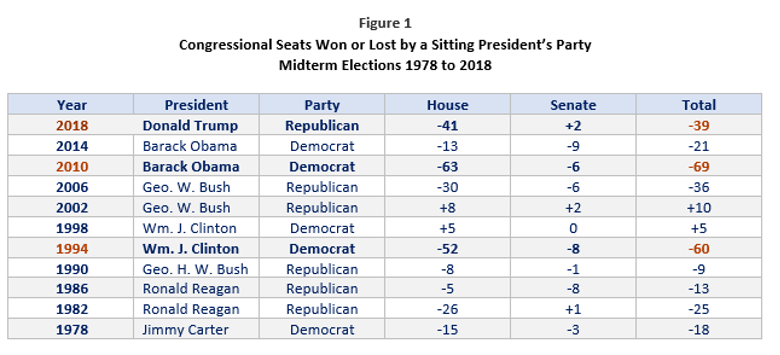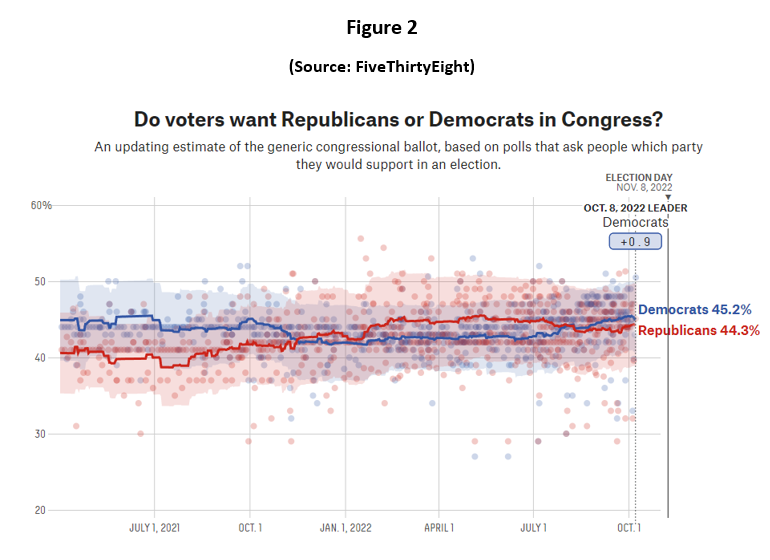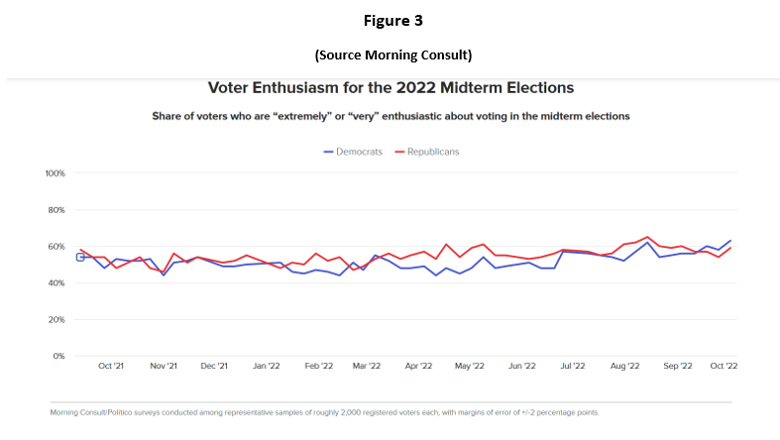Today’s Politics Are Tomorrow’s Climate Policies (part 1)


· 10 min read
The US is less than a month away from the 2022 midterm elections. In fact, mail-in balloting has already begun in some states, including Minnesota, Virginia, Illinois, and Michigan, and soon in other crucial states like Arizona, Ohio, and Georgia.
Generally, balloting in non-presidential elections is characterized by low voter turnout and the loss of congressional seats by a sitting president’s party. In the modern era, a sitting president’s party has lost an average of 30 seats in Congress.
Since 1980, the balance of congressional power has remained the same in four elections. In 1994 and 2006 the Democrats captured both the House and Senate. Three times the Republicans picked up the House or the Senate from Democrats.

Through the first half of this year, the 2022 midterm looked much like elections past. For Democrats, that meant a problem motivating their base even to cast their ballots. While for Republicans, the outcome looked rosy. The odds of taking control of one or both chambers of Congress were high.
And then came June. And things changed — radically!
In Dobbs v. Jackson Women’s Health Organization, the high court overturned Roe v. Wade —stripping women of their constitutional right to an abortion. The 6 to 3 decision sent two messages.
The first message was that Chief Justice Roberts would not be the hoped-for tempering influence over his five conservative colleagues—three of whom were nominated by Trump. The second was that conservative justices lacked any compunction about overturning cases long thought established law in one fell swoop.
The Dobbs decision infused energy into Democratic and independent circles, causing an intensity that until then seemed lacking. The burst didn’t so much change what the pollsters were saying about the Republicans taking the House and possibly the Senate as their predictions of the margin of victory.
Will the 2022 midterms be like 1994, 2006, and 2018? Or will they result in narrow majorities like those of the 117th Congress, no matter the victors?
For the moment, it’s looking like the GOP tide has turned into more of a trickle than a wave. However, outlooks change almost daily.
Voter surveys should be viewed with the understanding that they depend upon the willingness of respondents to tell pollsters what they’re truly thinking. Even then, they offer only a snapshot of the moment.
In 2016, Trump supporters were loath to fess up to who they would be voting for in the election. Sometimes they simply enjoyed messing with the pollster. Six years on, and there’s nothing to suggest that has changed.
The Democrat’s cautious “optimism” of recent days is based on their having gained a slight edge over Republicans on the generic ballot. The generic ballot is a poll question that asks voters which party they’ll likely be voting for in the election.
Figure 2 shows a Democratic up turn over Republicans around the middle of August—just weeks after the Dobbs decision. The lead is slight—less than a percentage point—and the trend seems to be in a downturn. (FiveThirtyEight calculates its findings as an average of polls, and readers are encouraged to use the interactive graphs available on its website.)

Republicans had hoped to make the elections a referendum on President Biden and congressional Democrats. The themes and screams of GOP candidates and their backers have centered on what they believe is profligate spending that adds additional inflationary pressures to the domestic economy and the failure to stem the tide of immigrants knocking on America’s door.
Then, too, they accuse the administration and congressional leaders of caving to party progressives in adopting what they call the woke socialist agenda. They believe the recently enacted Inflation Reduction Act (IRA) that focuses on combating climate change and helping communities to adapt and become more resilient to its consequences is a cornerstone of the woke agenda.
The Dobbs opinion is not the only SCOTUS decision likely generating the types of concerns needed by the Democrats to raise their numbers in November. Voting rights and the federal government’s powers—especially the Environmental Protection Agency (EPA)—also look to turn the upcoming elections into a higher interest affair than previously thought.
On the heels of Dobbs, the high court announced its decision in West Virginia v. Environmental Protection Agency. Again, by a 6 to 3 vote, the high court ruled that Congress did not grant EPA the authority to order reductions in greenhouse gas emissions based on the Clean Power Plan (CPP).
The CPP permitted generation-shifting between facilities. Now, the rules must be limited to what a single facility can achieve. Regulators refer to this as behind the fence line.
The CPP was to be Obama’s climate legacy. It was finalized in 2015 and was immediately plagued by legal challenges from fossil fuel companies and red state attorneys general. It never came into force.
The high court’s decisions appear to have helped Democrats gain a slight edge over Republicans in voter enthusiasm. (See Figure 3) Whether “enthusiasm” translates into actual votes is another matter.

The critical question is whether the Democrats can hold onto their recent—albeit slight—advantages or whether the pendulum will swing back to the Republicans as it generally does.
Democrats had hoped to run on their record of accomplishments, including the $2 trillion American Rescue Plan of 2021, the IRA, the bipartisan Infrastructure Investment and Jobs Act (IIJA), and the CHIPS and Science Act. Taken together, the several pieces of legislation put into play most of what President Biden and the Democrats promised in the run-up to the 2020 elections.
Interfering with the Democrat’s strategy of accomplishments are the horrific approval ratings of President Biden. According to FiveThirtyEight’s average of polls, Biden’s current approval number is 42.5[i] percent — off the July low of 38 percent.
The hand of the former president has kept the cauldron of the culture wars boiling throughout this election cycle. Trump and his minions continue to question the validity of the 2020 presidential elections.
Keeping the lie alive and promising to do something about it—If elected—are a must for those seeking the ex-president’s endorsement. Seventeen Trump-approved candidates for secretary of state have gone so far as to create the America First Secretary of State Coalition.
In the words of Sue Halpern:
Members of the America First Secretary of State Coalition are attempting to repurpose
the office [of secretary of state] from a mainly administrative function into “a linchpin in the right-wing effort to manipulate elections.”
Republican secretary of state candidates aren’t the only ones willing to believe the election was stolen from under the ex-president. According to the Washington Post, 299 of the 569 candidates surveyed have denied or questioned the outcome of the last presidential election.
More heated even than the sniping between the parties is the battle within Republican ranks between establishment conservatives and Trump populists. The fiercest conflicts are being played out in the Senate.
Trump has continued to rage against Senate Minority Leader McConnell (R-KY), who he sees as the RINO ring-leader. RINO stands for Republican in Name Only — a group that includes Republican Senators Murkowski (AK), Romney (UT), Collins (ME), and Burr (NC).
At one time or another over the past two years, the ex-president has even accused his golfing buddy Lindsay Graham (R-SC) of being one of those. In essence, any senator that voted for the IIJA, IRA, or various resolutions and acts that keep the federal government under Biden open risks being tagged with the RINO appellation.
The Senate battle between the forces of Trump and the RINOs is particularly fierce because of the animosities between Senator Rick Scott (R-FL) and Senate Minority Leader McConnell. Scott is a close ally of the former president and chair of the National Republican Senatorial Committee that helps fund and otherwise support Senate candidates.
Several weeks ago, McConnell called into question the character of several Senate candidates and downplayed the odds of Republicans reclaiming the Senate. It was a statement that rankled both Scott and Trump.
McConnell has been very public about wanting to keep substantive ideas out of the 2022 congressional elections. He reasons that the absence of specifics would make the election mostly about Biden and, in any event, make it harder for the Democrats to take issue.
The Senate Minority Leader has consistently defined his role as just saying NO to the Biden administration. The number of times the Senate Minority Leader has indicated an interest — if not outright support — for a piece of legislation, e.g., gun control and keeping the federal government open, can be counted on one hand.
Scott, however, has continued to propose ultra-MAGA (Make America Great Again) agenda pieces he says Senate Republicans will put into play should they retake the upper chamber. McConnell had something else to say on the matter:
If we’re fortunate enough to have the majority next year, I’ll be the majority leader...and decide in consultation with my members what to put on the floor...Let me tell you what will not be on our agenda.
The Minority Leader has made no secret of his antipathy towards Scott’s agenda.
Following McConnell’s support for a short-term resolution that keeps the federal government open until December 16th, Trump released a rant that has been called both racist and dangerous given how high tensions are in America.
Is McConnell approving all of these Trillions of Dollars’ worth of Democrat sponsored Bills...because he hates Donald J. Trump...or...because he believes in the Fake and Highly Destructive Green New Deal and is willing to take the Country down with him? In any event...He has a DEATH WISH. [He] Must immediately seek help and advice from his China-loving wife, Coco Chow![ii]
Senator Scott has had nothing to say about Trump’s statement.
Once the dust settles in November, it may be that once again tribe trumps everything else. As long as candidate X will vote the way the current or former president wants them to, the fact that they lied on their tax forms or were part of the seditious assault on the US Capitol is to be overlooked.
Realistically speaking, continued forward progress on climate matters at the federal level is possible only if the Democrats can maintain control of Congress. There are caveats to consider, of course.
Senator Manchin (D-WV) has been the goat and the champion of climate policy over the past two years. Should the Democrat’s Senate majority continue to be contingent on all 50 Democrats voting together, any new legislation is unlikely to be enacted—at least until he gets his way on streamlining the permitting of fossil fuel and energy infrastructure projects.
It would be wise for climate advocates to remember that Manchin—perhaps more than any other Democrat, including President Biden—was a major force behind the bipartisan infrastructure and CHIPs legislation. I’ve written before that when it comes to Manchin — no quid, no quo.
Manchin’s change of heart led to the IRA and antagonized Republicans to no end. They thought the coal state Senator was on their side regarding anything remotely reminiscent of a Green New Deal.
The impact of a Republican Senate on climate policy will be limited unless they have 60 reliable votes. Therefore, the most likely scenario is that a Republican Senate will be actively engaged in putting forward messaging bills to build a platform for the 2024 presidential elections.
It’s difficult to conceive that McConnell will not lead a Republican Senate, in which case the feud between the Kentuckian and Trump will continue. How much McConnell and the more establishment conservatives like Senators Murkowski, Collins, and Romney will have to give up to the populists will depend on the performance of Trump-approved candidates in November.
The probable victim of the 2022 midterm elections is bipartisanship. The biggest surprises in the nearly two years of the 117th Congress was the cross-aisle collaboration that managed to pass the IIJA and CHIPS legislation.
Between ruffled feathers, party infighting and preparing for the 2024 presidential elections, the by-words of the 118th Senate will most likely be partisanship and gridlock.
Author's note to readers: This is the first in the series Today’s Politics Are Tomorrow’s Climate Policies. In the next installment I will focus on the impact of the midterm elections on the House of Representatives. It promises to be a brawling experience.
[i] As of October 8, 2022
[ii] Elaine Chao is Senator McConnell’s wife. She was Trump’s Secretary of Transportation.
Illuminem Voices is a democratic space presenting the thoughts and opinions of leading Sustainability & Energy writers, their opinions do not necessarily represent those of illuminem.
illuminem briefings

Public Governance · Social Responsibility
illuminem briefings

Carbon Regulations · Carbon Market
illuminem briefings

Public Governance · Social Responsibility
Financial Times

Carbon Market · Public Governance
The Guardian

Pollution · Nature
Politico

Public Governance · Social Responsibility